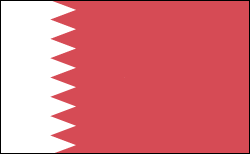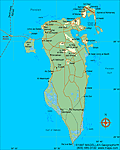Bahrain
King: Hamad ibn Isa al-Khalifah (1999)
Prime Minister: Khalifah ibn Sulman al-Khalifah (1970)
Land area: 239 sq mi (619 sq km);total area: 257 sq mi (665 sq km)
Population (2010 est.): 738,004 (growth rate: 1.2%); birth rate: 16.8/1000; infant mortality rate: 14.7/1000; life expectancy: 75.4; density per sq km: 1,080
Capital and largest city (2003 est.):Al-Manámah, 527,000 (metro area), 149,900 (city proper)
Monetary unit: Bahrain dinar
National Name: Mamlakat al Bahrayn
Current government officials
Languages: Arabic, English, Farsi, Urdu
Ethnicity/race: Bahraini 62.4%, non-Bahraini 37.6% (2001)
Religion: Islam (Shiite and Sunni) 81%, Christian 9%
National Holiday: National Day, December 16
Literacy rate: 89% (2003 est.)
Economic summary: GDP/PPP (2009 est): $28.0 billion; per capita $38,400.Real growth rate: 2.9%. Inflation:3%. Unemployment: 15%. Arable land: 2.82%. Agriculture: fruit, vegetables; poultry, dairy products; shrimp, fish. Labor force: 380,000; note: 44% of the population in the 15–64 age group is non-national; agriculture 1%, industry, commerce, and services 79%, government 20% (1997 est.). Industries: petroleum processing and refining, aluminum smelting, iron pelletization, fertilizers, offshore banking, ship repairing, tourism. Natural resources: oil, associated and nonassociated natural gas, fish, pearls. Exports: $12.5 billion (2009 est.): petroleum and petroleum products, aluminum, textiles. Imports:$10.37 billion (2009 est.): crude oil, machinery, chemicals. Major trading partners: Saudi Arabia, U.S., UAE, Japan, Germany, UK, France (2004).
Communications: Telephones: main lines in use: 191,600 (2004); mobile cellular: 649,800 (2004). Radio broadcast stations: AM 2, FM 3, shortwave 0 (1998). Television broadcast stations: 4 (1997). Internet hosts: 1,952 (2005). Internet users:152,700 (2005).
Transportation: Railways: 0 km.Highways: total: 3,498 km; paved: 2,768 km; unpaved: 730 km (2003).Ports and harbors: Mina' Salman, Sitrah. Airports: 3 (2005).
International disputes: none.
Major sources and definitions |
 |
Geography
Bahrain, which means “two seas,” is an archipelago in the Persian Gulf off the coast of Saudi Arabia. The islands for the most part are level expanses of sand and rock. A causeway connects Bahrain to Saudi Arabia.
Government
Constitutional monarchy.
History
Known in ancient times as Dilmun, Bahrain was an important center of trade by the 3rd millennium B.C. The islands were ruled by the Persians in the 4th century A.D., and then by Arabs until 1541, when the Portuguese invaded them. Persia again claimed Bahrain in 1602. In 1783 Ahmad ibn al-Khalifah took over, and the al-Khalifahs remain the ruling family today. Bahrain became a British protectorate in 1820. It did not gain full independence until Aug. 14, 1971.
Although oil was discovered in Bahrain in the 1930s, it was relatively little compared to other Gulf states, and the wells are expected to be the first in the region to dry up. Sheik Isa ibn Sulman al-Khalifah, who became emir in 1961, was determined to diversify his country's economy, and he set about establishing Bahrain as a major financial center. The country provides its people with free medical care, education, and old-age pensions.
Conflicts between the Shiite and Sunni Muslims are a recurring problem in Bahrain. The Sunni minority, to which the ruling al-Khalifah family belongs, controls nearly all the power and wealth in the country. the Shiites continue to agitate for more representation in government, and minor violent clashes have led to about two dozen deaths since 1994.
Internal Reforms Increase Bahrain's Attractiveness as an Ally to the West
Bahrain has been an important Western ally, serving as a Western air base during the Persian Gulf War in 1991 and the Iraq War in 2003. It continues to serve as the base of the United States' Fifth Fleet, which patrols the Gulf.
The emir, Sheik Isa ibn Sulman al-Khalifah, died in 1999 after four decades of rule. He was succeeded by his son, Sheik Hamad ibn Isa al-Khalifah, who gave himself the title of king but also began a sweeping democratization of the country: censorship has been relaxed and draconian laws repealed, exiles have been repatriated, and the stateless Bidoons have been granted citizenship. In a Feb. 2001 referendum, which permitted women to vote for the first time, Bahrainis overwhelmingly supported the transformation of the traditional monarchy into a constitutional one. In Oct. 2002, Bahrain had its first parliamentary election since 1973. In 2006, the U.S. and Bahrain signed a free-trade agreement.
Political Unrest in the Middle East Spreads to Bahrain
Anti-government demonstrations gripped several countries in the Middle East in early 2011, and Bahrain experienced some of the most violent confrontations between protesters and government forces and police. The protesters, inspired by recent events in Egypt and Tunisia, began their protests on Feb. 14. There has long been simmering tension between the populace, which is 70% Shiite, and the Sunni monarchy and ruling class. Shiites complain that they are excluded from top positions in the military and government and claim that the government encourages immigration of Sunnis and then gives Sunnis preference in hiring. In response to the protests, King Hamad offered each Bahraini a payment of about $2,700 and promised to increase jobs, which only emboldened the opposition. On Feb. 17, police fired on the demonstrators in Manama's Pearl Square, killing at least two people, and during the funeral the next day, government forces attacked mourners. The attacks drew a strong rebuke from the U.S., which bases the navy's Fifth Fleet in Bahrain and stations troops in the country.
The government withdrew troops on Feb. 18, and for the next several days thousands of triumphant protesters poured into Pearl Square. Crowds reached their peak on Feb. 22, with more than 100,000 protesters gathered in the square. The enormous pro-democracy protests continued for three weeks, but the euphoria was short lived. On March 14, at the request of King Hamad, Saudi Arabia and the United Arab Emirates dispatched 2,000 troops to help break up the protests. The presence of neighboring Sunni troops in a country populated by a majority of Shiites further inflamed sectarian strife. The Shiites labeled the deployment an "invasion." When violence broke out between protesters and troops, King Hamad declared martial law and resumed implementing repressive tactics against the opposition, including using force to remove protesters from Pearl Square, warrantless searches, mass arrests, and there were allegations of torture. King Hamad lifted the state of emergency on June 1, but the country remained tense and on the brink of violence.
In June King Hamad appointed an independent commission to investigate the crackdown by his security forces on protesters. The report released in November found widespread human-rights abuses, saying prisoners—mostly Shia—were hooded, whipped, beaten, and given electric-shock treatment. Five prisoners died in custody. While the report was an embarrassment to the government and highly critical, it proved that the king followed up on his promise to fairly and fully investigate the allegations of abuse. Hamad said the perpetrators will be fired.

No comments:
Post a Comment